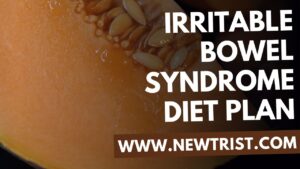The irritable bowel syndrome diet plan includes oats, tofu, coconut milk, almond milk, carrots, potatoes, pumpkin, eggplants, and cantaloupes.
|
Morning Drink |
Peppermint tea |
|
Breakfast |
Overnight Banana Chocolate Oats |
|
Midmorning |
2 slices of Cantaloupe |
|
Salad |
Blueberry spinach salad |
|
Lunch |
Pumpkin & Carrot Risotto |
|
Soup |
Potato and spinach soup |
|
Evening snack |
Dark Chocolate, Nuts, and Sea Salt Snack Bar |
|
Dinner |
Maple Garlic Glazed Salmon + 1 cup cooked brown rice |
Best Nutritionist in Bangalore
Consult 19-year-experienced Chief Nutritionist Vasanthi, in person at HSR, Koramangala, Bellandur, Haralur, Electronic city, or online across India.

Table of Contents
Irritable Bowel Syndrome (IBS)
Irritable Bowel Syndrome is a Gastrointestinal disorder that affects the large intestine causing pain in the abdomen, stomach bloating, diarrhea, or constipation.
The abdominal cramps and pain observed are due to the contraction of the colon muscles. A person may diagnose that he has IBS if the following symptoms are worse after eating or feels better after emptying the bowel. During this condition, the food that we eat may pass through the gut too fast or too slow.
The different types of irritable bowel syndrome are IBS with Diarrhoea, IBS with Constipation, and IBS with mixed bowel habits. IBS can be easily treated by making a few changes in diet and lifestyle. Women are more likely to experience IBS when compared to men.
Irritable Bowel Syndrome Foods to Avoid
A healthy nutritious diet means consuming a lot of nutritious foods. But certain foods may be uncomfortable for people with irritable bowel syndrome. Some foods may increase the symptoms of IBS for different kinds of people.
Avoiding some foods may reduce cramps, and bloating and regulate bowel movements. Some vegetables like cabbage, cauliflower, broccoli, sauerkraut, Brussels sprouts, asparagus, onions, and shallots cause gas and alter bowel habits. Some of the foods to avoid are
- Dairy products
- Caffeinated drinks
- Deep-fried foods
- Gluten
- Insoluble fibers
- Beans and legumes
- Cruciferous vegetables
- Processed foods
- Chocolates
- Artificial sweeteners

Best Vegetables For IBS
According to research conducted by Harvard Medical School, high FODMAP foods are not easily absorbed by the small intestine. FODMAP (Fermentable oligosaccharides, disaccharides, monosaccharides, and Polyols) foods consist of three phases – Elimination, Reintroduction, and Integration.
Elimination is avoiding foods that are high in FODMAP, Reintroduction is reintroducing FODMAP foods one after the other and finding out which food is problematic. Integration is reversing to the normal diet after finding out which food is causing symptoms.
FODMAP is low in vegetables like
- Carrots
- Potatoes
- Green beans
- Pumpkin
- Eggplants
- Spinach
- Kale
- Seeds such as pumpkin seeds, sunflower seeds, and sesame seeds
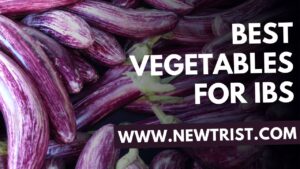
Fruits For IBS
Fruits are rich in essential nutrients but fruits having a high amount of fructose may aggravate the symptoms of IBS. Some fruits low in fructose are
- Blueberry
- Cranberry
- Boysenberry
- Cantaloupes
- Grapes
- Oranges
- Lemon
- Kiwi
- Strawberries
- Bananas

Low FODMAP Diet For IBS
When foods with fodmap are consumed, they are not easily broken down in the small intestine and move to the large intestine. The undigested food absorbs water and causes fermentation due to the presence of microorganisms in the large intestine which produces gas.
A diet low in FODMAP is usually recommended for people with irritable bowel syndrome (IBS). According to research, a low FODMAP diet reduces symptoms in 86% of people with IBS.
Some types of carbohydrates like starchy foods and sugars, and fiber-rich foods come under the category of low FODMAP foods. These foods don’t cause discomfort unless they are eaten in moderation.
Some of the low fodmap foods to include are
- Non-dairy products such as almond milk, coconut milk, rice milk, soya milk, lactose-free yogurt, hard cheeses, brie, and camembert
- Fiber-rich foods such as oats, rice bran, and quinoa
- Protein-rich foods such as tofu, chicken, fish, and eggs
- Fruits and vegetables
- Nuts such as almonds, walnuts, and peanuts
- Olive oil instead of butter and refined oils
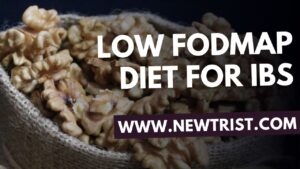
Foods Good For IBS
Lifestyle changes and adopting a fitness routine instead of a sedentary life make great differences. Avoiding certain foods may lead to a deficiency of vitamins and nutrients.
It is necessary to substitute the foods to meet the daily requirements of the body. For some people, diet along with exercise helps to control IBS without medication.
- Include oats in the daily diet regularly
- Eat 1 tablespoon of linseeds
- Green tea and black tea
- Fresh fruit juices and smoothies
- Probiotic foods and drinks
- Homemade peanut butter
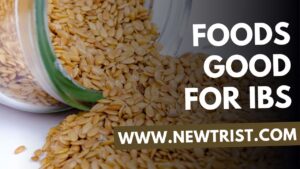
What food to eat when your stomach is upset?
The most common cause of upset stomach or abdominal pain is an infection with a virus that inflames the intestines and stomach walls.
Ginger Can Relieve Nausea and Vomiting
Vomiting and nausea are frequent signs of an upset stomach. Natural treatments for both ailments typically include ginger, a fragrant edible root with brilliant yellow flesh. Ginger is useful in all forms and can be consumed fresh, boiled, steeped in hot water, or taken as a supplement.
Women who have morning sickness, a type of nausea and vomiting that can happen during pregnancy, frequently take it. One gram of ginger taken daily was linked to five times less morning sickness and vomiting during pregnancy.
Due to severe nausea and vomiting that can result after chemotherapy and major surgery, ginger is especially beneficial for those who are having these procedures. Before receiving chemotherapy or having surgery, taking 1 gram of ginger every day might considerably lessen the intensity of these symptoms.
Even motion sickness can be treated naturally with ginger. When taken beforehand, it can lessen how bad the sensations of nausea are and hasten recovery. Ginger is thought to control neural system signaling in the stomach and hasten the process of emptying the stomach, which lessens nausea and vomiting.
Although heartburn, stomach pain, and diarrhea can happen at doses above 5 grams per day, ginger is generally regarded as harmless.
Chamomile May Reduce Vomiting and Soothe Intestinal Discomfort
The herbal plant known as chamomile, which has tiny white blooms, is a traditional treatment for unsettled tummies. You can consume chamomile as a supplement or dry it out and make tea.
A range of digestive issues including gas, indigestion, diarrhea, nausea, and vomiting, have historically been treated with chamomile. Additionally, chamomile is frequently found in herbal remedies that treat colic in infants as well as indigestion, gas, bloating, and diarrhea.
Peppermint May Relieve Symptoms of Irritable Bowel Syndrome
Irritable bowel syndrome, or IBS, results in an uncomfortable stomach. IBS is a persistent gastrointestinal disorder that can lead to diarrhea, constipation, bloating, and stomach pain. In individuals with IBS, using peppermint oil capsules regularly for at least two weeks can dramatically lessen diarrhea, gas, and stomach pain.
Researchers think that peppermint oil lessens the intensity of intestinal spasms that can cause discomfort and diarrhea by calming the muscles in the digestive tract.
Although peppermint is generally considered safe, patients with severe reflux, Hiatal hernias, kidney stones, or problems with the liver or gallbladder should exercise caution because peppermint may make these conditions worse.
Flaxseed Relieves Constipation and Stomach Pain
The fibrous seed can ease stomach pain and constipation while regulating bowel movements. Less than three bowel movements per week are chronic constipation, which is frequently accompanied by discomfort and pain in the abdomen.
Consuming flaxseed, whether in the form of flaxseed oil or ground flaxseed meal, has been demonstrated to ease painful constipation symptoms.
Green Bananas Help Relieve Diarrhea
Diarrhea is frequently a symptom of an infection or food poisoning that causes an upset stomach. It’s interesting to note that numerous studies have revealed that giving cooked green bananas to kids with diarrhea helps lessen the frequency, severity, and length of bouts.
For example, one study discovered that a rice-based diet alone was only slightly more successful at preventing diarrhea. Adults can get the same antidiarrheal effects from green bananas.
Additionally, it’s unknown if ripe bananas contain enough resistant starch to have the same benefits because resistant starches are converted to sugars when a banana ripens.

Foods That Heal Stomach Lining
The microorganisms that reside in your intestines are referred to as your “gut microbiome.” Each person’s digestive tract contains roughly 200 different types of bacteria, viruses, and fungi.
There are many microbes such as good bacteria that assist a healthy gut, whereas some are toxic to human health. Having a wide variety of bacteria in the stomach may help lower the risk of diseases like inflammatory bowel disease, psoriatic arthritis, and diabetes.
Obtain the protein and nutrients your body requires for self-healing. Help you eliminate all foods that are irritating your stomach and small intestine lining. It can aid in reducing or controlling the signs and symptoms of illnesses like Crohn’s disease, bacterial infections, and celiac. Fill in the nutritional gaps with a balanced healthy meal.
Many parts of modern life can affect your gut microbiome, including
- High-stress levels
- Too little sleep
- Eating highly processed and high-sugar foods
- Taking antibiotics
This in turn may affect other aspects of your health, such as:
- Immune function
- Hormone levels
- Weight
- Development of diseases
Symptoms if a person has reduced gut health
- Upset stomach
- A high-sugar diet
- Unintentional weight changes
- Sleep disturbances or constant fatigue
- Skin irritation
- Autoimmune conditions
- Food intolerances
Things to do to improve gut health:
- Lower your stress levels
- Get enough sleep
- Eat slowly
- Stay hydrated
- Take a prebiotic or probiotic
- Check for food intolerances
- Change your diet
Foods for a healthy gut
There seems to be a strong connection between diet and intestinal health. Some foods promote the growth of harmful bacteria, so it is advisable to avoid processed meats, high-fat foods, and foods high in refined sugars that hinder the growth of healthy microbes in the intestine.
General health can be improved by the smart selection of foods that increases the development of healthy bacteria in the gut. These foods consist of
High fiber foods
Research indicates that high-fiber foods have a positive impact on gut health. These foods include:
- Legumes, like black beans and chickpeas
- Whole grains, like oats and quinoa
- Vegetables, like broccoli and asparagus
- Nuts, like almonds and pistachios
- Fruits, like apples and peaches
Garlic: According to research, garlic may increase gut microbiome diversity and improve gut health. Another found that aged garlic extract increased diversity and levels of beneficial bacteria.
Fermented foods
Fermented foods are rich in probiotics. Research suggests that consuming these foods may improve the gut microbiome.
Examples include:
- Kimchi
- Sauerkraut
- Yogurt
- Kefir
Collagen-boosting foods
Foods high in collagen, such as bone broth, and salmon skin, may be good for intestinal health as well as general health. Collagen supplements may help gut microbiomes.
One should try to modify the diet in such a way that more collagen is produced by your body. Try eating more foods to encourage your body to produce collagen
- Citrus fruits
- Broccoli
- Meat
- Eggs
- Nuts
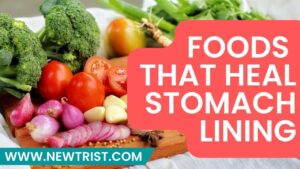
Irritable Bowel Syndrome Diet Plan Recipes
Roasted Carrot and Ginger Soup Ingredients
- Carrots (peeled and cut into small pieces)
- 5 tablespoons fresh ginger (grated)
- Garlic cloves
- 2 tbsp olive oil
- ¼ tsp cumin powder
- Salt and pepper
- Vegetable stock
- 1 bay leaf
- Sour cream (plant-based)
Cooking instructions
- Heat a skillet on medium heat and add olive oil
- Add the carrot and garlic, give it a toss and sprinkle some salt, pepper, and cumin powder
- Roast the vegetables until they are done
- Add the vegetable stock to a large saucepan and bring it to a boil.
- Add the roasted carrots and garlic along with grated ginger and bay leaf.
- Boil on low flame for 15 minutes
- Switch off the flame. Let it cool. Remove the bay leaf.
- Blend all the ingredients using a blender until a smooth consistency is reached
- Add more vegetable stock if the mixture is too thick
- Check seasoning and adjust according to taste
- Garnish with sour cream and fresh chives and serve hot.
Nutritional Values
Energy – 76 calories, Protein – 1 g, CHO – 11 g, Fat – 2.5 g, Fiber – 3 g.
Benefits
Roasted Carrot and Ginger soup are rich in antioxidants, beta-carotene, and vitamins. It is gluten-free, vegan, and plant-based. Beta carotene is a compound that converts into vitamin A by the body and proves beneficial for the eyes to prevent cataracts and other eye-related ailments.
Antioxidants can lower the risk of cancer and are good for the heart. Carotenoids and Anthocyanins are the two types of antioxidants found in carrots.
Consuming raw carrots are found to be helpful during constipation as they are rich in fiber. They help to manage diabetes as it is a non-starchy food. Carrots are rich in vitamin K and calcium which help strengthen the bones.
